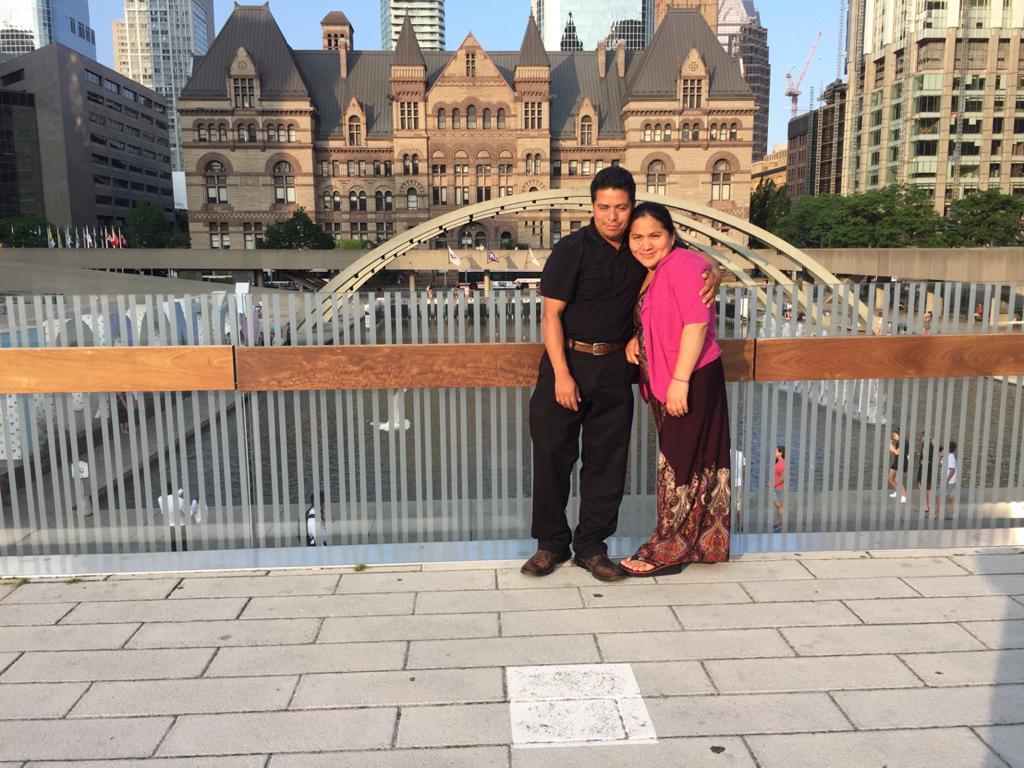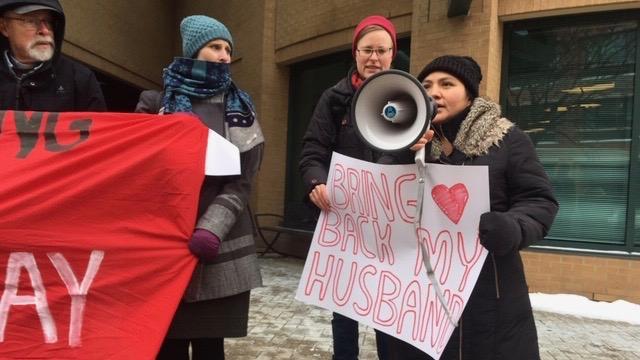What happens to the American children of asylum-seekers in Canada?
Sandra Morales speaks at Dec. 19 action in front of Member of Parliament Bardish Chagger’s office.
At age 13, Sandra Morales traveled with her sister from Guatemala to Detroit where she eventually met her husband, Daniel Roblero. Like her, he’d left Guatemala as a teenager.
The couple didn’t have legal status in the US, but their six kids are all American citizens. They had never thought about leaving the country until President Donald Trump took office.
“When Trump started to say there would be tougher laws against immigrants,” Morales said, her husband, who had already been deported from the US twice, told her: “I’m afraid. If I get caught again, what’s going to become of the children if they catch you? What will the children do, and where will they be sent?” she said.
Related: Fearing detention, undocumented immigrants seek ways to appoint guardians for their children
Daniel Roblero had brothers living in Ontario who had managed to regularize their status — they encouraged him to come north. He and Morales also heard news stories about the country’s welcoming attitude toward refugees, and ultimately decided to travel to Canada in March 2017, leaving a network of friends and extended family in Detroit. Their oldest son, Gimder Roblero, now 18, took it especially hard.
“I’m not going to lie, but I cried when I came here because I’m so used to living in Detroit,”
“I’m not going to lie, but I cried when I came here because I’m so used to living in Detroit,” Gimder Roblero said.

Despite living so close to the border for most of his life, he said, “It was my first time coming here, and it felt weird for me.”
Now, as the family seeks asylum in Canada — which hasn’t been favorable thus far — they face a difficult decision about whether to keep the family together or send their children back to the US to live with other relatives.
Related: 10 US immigration issues to watch in 2020
They’re not alone. It was around the time that the Morales-Roblero family arrived in Ontario that Canada began to see a rise in requests for asylum from people who previously lived in the United States.
As a part of that, said Andrew Brouwer, a refugee attorney at Legal Aid of Ontario, “We’ve seen more US-citizen kids, of course, coming to Canada together with their non-US-citizen parents.”
Government statistics show 1,826 refugee claimants whose country of alleged persecution was the United States between January 2017 and September of 2019, whom the Immigration and Refugee Board of Canada said via email “are by and large dependent minors born in the USA who are accompanying parents alleging persecution against a different country.”
The Canadian government’s decisions on parents’ cases affects the kids’ futures, too.
The children’s right to stay in Canada is generally based on the outcome of their parents’ asylum cases.
The Canadian government has been working through a backlog of asylum applications, but, based on asylum acceptance rates, it’s likely that many families will ultimately have their refugee claims denied. For mixed-nationality families, that can mean a painful choice: take their American children back to the parents’ home country or have them return to the United States, where they can continue their education and often live in safer conditions.
Related: One Latina’s journey to college amid admissions scandals and inequities
Frantz André, who works with Haitian asylum-seekers in Québec, has seen cases of parents in deportation sending their children to live with other family members in the United States.
“They would send them back to the [US] because of what’s happening in Haiti,” André said, referring to ongoing political unrest and protests. “They don’t want to take a chance.”
Other families, he said, have had children in Canada while awaiting a decision on their asylum cases. The children may either return to Haiti or stay in Canada in the care of family members who are permanent residents or citizens.
Canada paused deportations to Haiti in 2019 because of ongoing protests and violence, which André said has deferred this difficult choice for other families.
The Immigration and Refugee Board of Canada (IRB) denied the Morales-Roblero family’s asylum request, saying they hadn’t proven they were specifically targeted by violence in Guatemala.
The family did not report to the airport for their first scheduled deportation flight, hoping they would still receive a positive response to their request to stay in Canada on compassionate and humanitarian grounds.
“When you think you’re at risk, that your life is at risk in your country and moreover, think of your children who will also be in danger, the only thought is to protect your children.”
“When you think you’re at risk, that your life is at risk in your country and moreover, think of your children who will also be in danger, the only thought is to protect your children,” Morales said, explaining the decision to stay in Canada.
Related: US immigration system is full of hurdles for pregnant women and new mothers
However, Daniel Roblero was detained following a traffic stop when driving his children to school and deported in November, leaving Morales and the children in Canada with a later deadline to leave the country.
Immigrants with a pending request are still expected to leave the country, but attorney Brouwer pointed out that acceptance rates plummet once they do so.
Between January and April of 2018, the approval rate for applicants confirmed to have departed from Canada was 3.8% versus 64.9% for applicants still in the country, according to government data.
Immigration, Refugees and Citizenship Canada said individuals who receive approval to stay in Canada after their removal from the country are responsible for the financial cost of traveling back. So, that’s another reason to stay put.
Recently, Morales and her son, Gimder Roblero, met with a border officer about their request for the younger children to return to the US with him.
“It was going to be hard because I have to work [and] drop out of school,” Gimder Roblero said, adding, “I will never give up, and I’d do anything for my siblings.”
But at that meeting, the CBSA said the younger children would be sent back to Guatemala with Morales.
Gimder Roblero said he would return to the US alone and work to raise money to pay for his siblings’ travel to the United States.
Morales said that other relatives in Detroit had also agreed to help care for the children.
A CBSA spokesperson said the agency can’t comment on specific cases, but that “every effort is made to preserve the family unit.”
The spokesperson said via email, “Generally, in cases where the children have US citizenship and the parent would rather the children return to the US while the parent returns to their home country (not the US), the CBSA will verify or have the parent provide proof that the minor has family in the US who is willing and capable of safely caring for the minor […] should there be a question that the family member is not willing and capable to safely care for the unaccompanied minor, the CBSA will make arrangements on a case by case basis.”
Brouwer, the attorney, said CBSA doesn’t set out to overrule parents.
“Parents are understood to be acting in the best interest of their kid. So, if the parent says that the kids should go to a different country from where they’re going, and the kids have the right to go there, generally CBSA would be expected to take that into account.”
“Parents are understood to be acting in the best interest of their kid. So, if the parent says that the kids should go to a different country from where they’re going, and the kids have the right to go there, generally CBSA would be expected to take that into account,” he said.
However, with the agency’s mandate to deport people quickly, he said families’ wishes may be overruled without strong advocacy and support.
The family speaks by video chat in the evenings. Morales said that her youngest, her 5-year-old son, doesn’t understand why his dad is in Guatemala.
“I’m so sad when I hear my baby say [to dad in the video chats], ‘Please, drop me at school, pick up me, why [don’t you] come?’ So, it’s really hard,” she said.
Morales said she also sometimes thinks her children might be better off with her in Guatemala.
“Only life is still so difficult there, dangerous for them and I don’t want that [for them],” she said, noting that having lived in North America can make someone a target for extortion by gangs.
They think that returning families “have a lot of money because they lived [a] long time there,” she said.
Morales sometimes regrets the risk she and her husband took going from trying to stay under the radar of immigration enforcement in the United States and then trying to obtain legal status in Canada.
“I have not lost the hope that I can stay because I like this country. It’s a nice country for my children, too.”
Still, she said, “I have not lost the hope that I can stay because I like this country. It’s a nice country for my children, too.”
Morales’ latest deportation date was set for February 2020. But, in December, the agency postponed her departure while they review the risk to her safety in Guatemala if she is removed. That review could take weeks or months.
Meanwhile, her husband, Daniel Roblero, remains in Guatemala.
